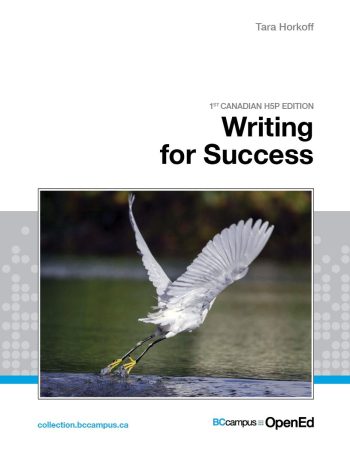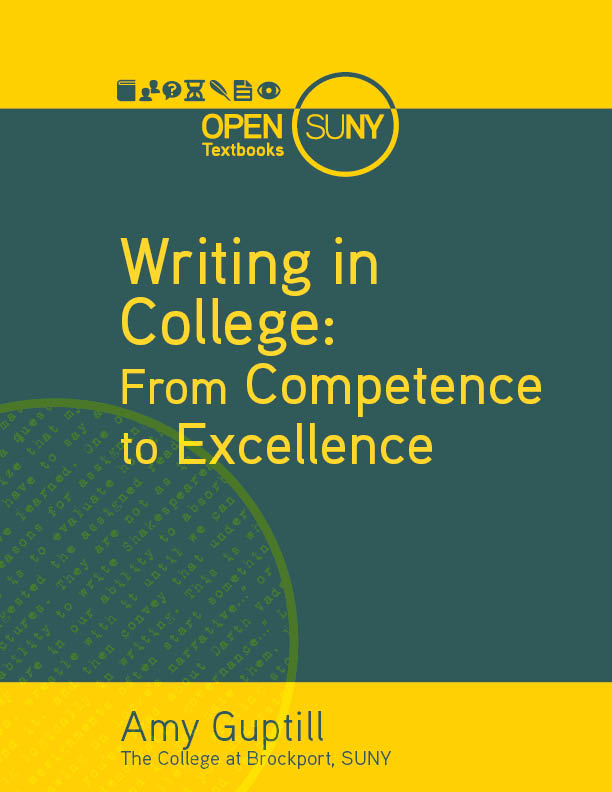SummaryCanadian colleges and universities traditionally function as research institutions and scholarly communities, although not every student is aware of and can adapt immediately to this. Colleges and universities expect and train students to:
Writing is an incredibly effective tool to:
|
True or False: You can only get good grades if your professors see how much you can memorize your textbook.

False.
You are not expected to demonstrate how much of the course material you can memorize on a short-term basis, but how you critically and intellectually engage with the material to create something of your own.
Imagine this, if you were digging for treasure, would you care more about digging deeper and farther into the ground, or about stacking the soil as high as possible?
Writing, therefore, is usually one of the first foundational skills you learn in any higher education program for a couple of reasons:
While it is true that everything is virtually searchable these days, being able to question what you have been taught to believe is where the organic learning process really starts.
To better explain the relations between writing thinking, and learning, let's think of it as an onion (not the part where it makes you cry).


1. Imagine the core of the onion as a product of the thinking process (an idea or a thought, for example). To reach the idea, we will have to peel off all the outer layers by:

2. In reality, however, a lot of times when you are cooking, you don't peel the onion by the layers: you chop or dice or mince the whole thing.
Sometimes you start with an idea, go through the research process, gain a new understanding on a topic, then have to start from scratch all over again. The writing, thinking, and learning process is messier, more chaotic, and a lot less straightforward than anyone has prepared you for. But this reiterative loop is far more effective at helping you retain information than trying to memorize as much as possible.
Amidst this messy process, writing comes in as a tool to help you sort out your thinking and learning. Writing is not just the end product of your thinking and learning process, something that you use to signal to your instructor that you have finished learning what they taught, or that you have done the work they assigned. In fact, at every step of the way, you can be writing:
While this is a rather simplistic example of how writing, thinking, and learning relate to each other, it argues that writing is inseparable from learning and that despite the learning curves, the misconceptions, and the overlapping deadlines, eventually you will be able to cook a whole meal with the onion you have chopped. That is the ultimate goal of your study: to teach yourself the skills that can feed you for life.
Eberly Center. (2008a, June 28). What Is the Value of Students Learning to Write in Your discipline? Carnegie Mellon University. https://www.cmu.edu/teaching/designteach/teach/instructionalstrategies/writing/value.html
Eberly Center. (2008b, June 28). Why are students coming into college poorly prepared to write? Canergie Mellon University . https://www.cmu.edu/teaching/designteach/teach/instructionalstrategies/writing/poorlyprepared.html
Horkoff, T. (2021). Post-secondary reading and writing. Writing for Success – 1st Canadian H5P Edition. BCcampus. https://opentextbc.ca/writingforsuccessh5p/chapter/post-secondary-reading-and-writing/
This glossary breaks down some common terms related to academic writing to help you better navigate it.
|
Term |
Explanation |
|---|---|
| academic writing noun |
Writing in an academic context for academic readers, to discuss a specific topic. Academic writing is usually non-fiction and can be in many forms: essays, reports, research papers, journal articles, proposals, reflections, etc. |
|
analyze
analysis |
To break down a concept or topic or idea into smaller parts to gain a better understanding of said concept/topic/idea. You may be asked to write an essay to analyze the declining popularity of superhero movies in recent years. You will have to break the topic down into smaller questions as below to help you and your readers understand the topic better:
A type of writing in which the writer breaks down a concept or topic or idea into smaller parts to gain a better understanding of said concept/topic/idea, sometimes to generate new meanings. |
|
argue argument |
To present and defend a point of view, using reasons and evidence.
|
| audience noun |
Readers of a piece of writing. When writing in an academic context, writers may consider their potential readers, e.g. instructors, students, researchers, reviewers, etc. to use appropriate language and rhetoric. The audience of a midterm essay submitted for ENG101 might be your instructor, but the audience of a text asking if you should get more toilet paper from the store is more likely your roommate. |
| brainstorm verb |
To generate ideas about a certain topic as a starting point for further research and drafting. |
| discourse noun |
Written or spoken communication or debate about a certain topic. |
|
draft |
An unfinished version of your writing. Writers tend to go through multiple drafts before submitting or publishing the final version of their writing, as they usually seek advice and feedback from their editors, peers, supervisors, friends, or family and revise extensively as part of their writing practice. |
| essay noun |
A type of writing in which writers demonstrate their understanding, exploration, and/or informed opinion on a certain area of study. Essays usually have one controlling topic/idea/concept. Length: Essays can be short (around 500 words) or long (10 - 20 pages),depending on the purpose of your essay and the requirement of your assignment. Structure: While most essays follow the introduction - body - conclusion structure, there is no standardized method to organize your essay, despite the common misunderstanding that essays can only be 5 paragraphs long. Instead, think of your essay as containing different sections, each dedicated to a particular argument or purpose and containing 1 or more paragraphs. |
|
feedback |
Comments that writers receive from their readers. Feedback is a common practice in writing that helps writers identify the strengths and weaknesses of their writing so that they can make appropriate changes and improve. |
| outline noun |
A list or map of the main points of an essay, paper, report, article, presentation, etc. |
| paragraph noun |
A unit of text in an essay or paper made up of several sentences, often dedicated to discussing one particular aspect of the essay or paper's main topic. |
| paraphrase verb |
To rewrite text by changing words and sentence structure but keeping the meaning the same. Often used when writers want to restate their point or make a reference to another text in their writing. |
|
revise |
To rewrite a draft in whole or in part to improve it, usually after receiving feedback. Revising is is a common practice in writing |
|
summarize |
To rewrite a text to only include the main points. |
| text noun |
Written or spoken words that carry meaning. Often used in academic settings as an umbrella term to refer to all written works. |
| thesis noun |
The controlling idea/topic of an essay or paper, often stating the writer's stance on a debatable position. |
| thesis statement noun |
A statement that clearly defines the controlling idea/topic of an essay or paper. Thesis statements can be more than one sentence and does not have to be at the end of the introduction. |
| topic sentence noun |
A statement that clearly defines the controlling idea/point/claim/argument of a section of an essay or paper. |
 Writing for Success – 1st Canadian H5P Edition
by
Tara Horkoff
Writing for Success – 1st Canadian H5P Edition
by
Tara Horkoff
 Writing in college: from competence to excellence
by
Amy Guptill
Writing in college: from competence to excellence
by
Amy Guptill